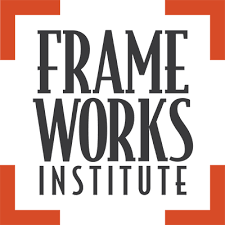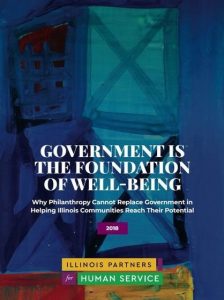FrameWorks Institute’s Sweetland Provides Advocacy Reframing Insights
November 1, 2018 As noted in the last newsletter, the National Human Services Assembly’s second What the Hill podcast on October 9, 2018, featured sociolinguist Julie Sweetland, Vice President for Strategy and Innovation at the FrameWorks Institute. Sweetland joined the National Assembly’s public policy team, Marie Camino and Brandon Toth, to offer guidance on how human service advocates can apply FrameWorks’ research to timely federal immigration public policy issues, including family separation policies, proposed changes to the public charge rule, and the 2020 Census.
As noted in the last newsletter, the National Human Services Assembly’s second What the Hill podcast on October 9, 2018, featured sociolinguist Julie Sweetland, Vice President for Strategy and Innovation at the FrameWorks Institute. Sweetland joined the National Assembly’s public policy team, Marie Camino and Brandon Toth, to offer guidance on how human service advocates can apply FrameWorks’ research to timely federal immigration public policy issues, including family separation policies, proposed changes to the public charge rule, and the 2020 Census.
Here are a few key takeaways from the conversation.
Use the Building Well-Being Metaphor
We know from FrameWorks’ research that the Construction Metaphor helps people understand well-being as an ongoing process influenced by outside factors, while the Value of Human Potential connects that process to a larger societal benefit. This makes the Building Well-Being Narrative well-suited to addressing current immigration policy communications challenges.
 For example, Sweetland notes how advocates have used building metaphors to explain how the administration’s family separation policy undermines early childhood development: brains are built like houses and disrupting relationships by separating families causes toxic stress that weakens foundations, with long-term consequences.
For example, Sweetland notes how advocates have used building metaphors to explain how the administration’s family separation policy undermines early childhood development: brains are built like houses and disrupting relationships by separating families causes toxic stress that weakens foundations, with long-term consequences.
Sweetland recommends a similar approach when discussing the administration’s proposed public charge rule, which would make it harder for immigrants and their families to access federally-funded services and supports. Begin the conversation with the shared value of human potential, and use the construction metaphor to explain how the proposed policy would chip away at foundations of well-being.
Normalize and Avoid Othering
Sweetland cautioned against accepting the self-sufficiency narrative and “othering” messages that tend to dominate debates around both immigration and human service policies. Instead, communicators can remind the public of the conditions that might lead anyone to need support, like jobs that don’t have adequate salaries, benefits, and schedules.
Provide Important Context
The accuracy of the data collected in the Census is essential to our nation’s long-term planning and preparation needs. Sweetland suggests that advocates approach the 2020 Census by grounding people in that context. The Census is important to our democracy because it allows the government to collect information needed to prepare and plan ahead for resources that all communities use, like schools, hospitals, and transportation.
Balance Challenges with Solutions
In response to a question about how to address critical, pressing policy problems without invoking counter-productive language, Sweetland advises against using crisis language and finger-pointing that can make people think there are no solutions. Instead, show people problems are serious and urgent but provide them with actions they can take now to make a difference and focus on the long-term.
This is a Long-Term Strategy
Remember that the Building Well-Being Narrative is designed to be effective over the long-term.
Sweetland observes that “social norms change all the time, more rapidly than cultural models or assumptions about how the world works,” so “the underlying beliefs that the [reframing] narratives are built to change have not gone away” and the “narratives are quite fresh and apt” to counter misperceptions, such as the belief that individuals are responsible for outcomes and well-being equals financial self-sufficiency.
For more details and insights, listen to the half-hour podcast interview with Sweetland.
 SPOTLIGHT ON
SPOTLIGHT ON
In other recent real world applications of reframing, Illinois Partners for Human Service, a statewide coalition of over 800 organizations and a National Reframing Initiative partner, released its latest report: “Government Is the Foundation of Well-Being: Why Philanthropy Cannot Replace Government in Helping Illinois Communities.” As always, Illinois Partners nicely weaves reframing values and metaphors into its analyses and recommendations by using “reaching full potential” language and the construction comparison, focusing on the importance of community well-being, and referencing the life cycle. The report “demonstrates how crucial it is for government to continue to fulfill its obligation to promote the well-being of individuals and families,” concluding that “together, government and philanthropy can provide an infrastructure of wellbeing that supports all members of society.”

